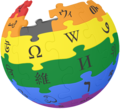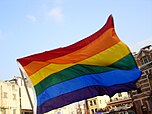Portal:LGBTQ
| Main page | WikiProjects & Things you can do |

|
The LGBTQ+ Portal |

|

|

|
Introduction Same-sex couple holding hands  LGBTQ (also commonly seen as LGBT, LGBT+, LGBTQ+, LGBTQIA, and LGBTQIA+) is an initialism for lesbian, gay, bisexual, transgender and queer or questioning. It is an umbrella term, originating in the United States, broadly referring to all sexualities, romantic orientations, and gender identities which are not heterosexual, heteroromantic, cisgender, or endosex. In the 1990s, gay, lesbian, and bisexual activists adopted the initialism LGB. Terminology eventually shifted to LGBT, as transgender people gained recognition. Around that time, some activists began to reclaim the term queer, seeing it as a more radical and inclusive umbrella term, though others reject it, due to its history as a pejorative. In recognition of this, the 2010s saw the adoption of LGBTQ, and other more inclusive variants. (Full article...)
Selected article -The Compton's Cafeteria riot occurred in August 1966 in the Tenderloin district of San Francisco. The riot was a response to the violent and constant police harassment of trans people, particularly trans women, and drag queens. The incident was one of the first LGBTQ-related riots in United States history, preceding the more famous 1969 Stonewall riots in New York City. It marked the beginning of transgender activism in San Francisco. The 1960s was a pivotal period for sexual, gender, and ethnic minorities, as social movements championing civil rights and sexual liberation came to fruition. Additionally, the 1950s created the foundation for the trans rights and gay liberation movements with the earlier Homophile movement. Though Stonewall is often heralded as the beginning of the trans rights movement, the importance of Compton's Cafeteria Riots and the homophile movement that came first. Social groups helped mobilize and even churches, like Glide Memorial Methodist Church in San Francisco, began reaching out to the transgender community. Nevertheless, many police officers resisted these movements and the increasing visibility of these groups, continuing to harass and abuse transgender people. This simultaneous rise in support for transgender rights on the one side and the unwillingness to accept these new ideas on the other created the strain that fueled the riot at Compton's Cafeteria in the summer of 1966. The incident began when a transgender woman resisted arrest by throwing coffee at a police officer. It was followed by drag queens and transgender women pouring into the streets, fighting back with their high heels and heavy bags. (Full article...) Selected biography -Alan Mathison Turing (/ˈtjʊərɪŋ/; 23 June 1912 – 7 June 1954) was an English mathematician, computer scientist, logician, cryptanalyst, philosopher and theoretical biologist. He was highly influential in the development of theoretical computer science, providing a formalisation of the concepts of algorithm and computation with the Turing machine, which can be considered a model of a general-purpose computer. Turing is widely considered to be the father of theoretical computer science. Born in London, Turing was raised in southern England. He graduated from King's College, Cambridge, and in 1938, earned a doctorate degree from Princeton University. During World War II, Turing worked for the Government Code and Cypher School at Bletchley Park, Britain's codebreaking centre that produced Ultra intelligence. He led Hut 8, the section responsible for German naval cryptanalysis. Turing devised techniques for speeding the breaking of German ciphers, including improvements to the pre-war Polish bomba method, an electromechanical machine that could find settings for the Enigma machine. He played a crucial role in cracking intercepted messages that enabled the Allies to defeat the Axis powers in many engagements, including the Battle of the Atlantic. (Full article...) Selected quote -
Current events
Selected image - Pro and anti-Proposition 8 protesters rally as the California Supreme Court holds a session to determine the definition of marriage. Proposition 8 is a constitutional initiative that restricted the definition of marriage in California as that of between a man and a woman.
Did you know… -
This month's birthdays
Selected listsRelated portalsFeatured contentThe following articles and lists have been identified as some of the best produced by the Wikipedia community:
TopicsCategoriesAssociated WikimediaThe following Wikimedia Foundation sister projects provide more on this subject:
Discover Wikipedia using portals |

























